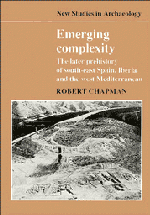Book contents
- Frontmatter
- Contents
- List of figures
- List of tables
- Preface
- 1 Two tribes: questions of theory, scale and explanation
- 2 Hello, goodbye: Iberian prehistory and traditional archaeology
- 3 Another one bites the dust: the implications of the absolute chronology
- 4 Getting better: south-east Spain, the cultural framework 5000–500 bc
- 5 Dancin' in the dark? Adaptation and intensification in south–east Spain
- 6 Centrefield: recent models of intensification and cultural change in south-east Spain
- 7 Into the groove: system scale and technological innovation in south-east Spain
- 8 Out of reach? Complexity, interaction and integration in south-east Spain
- 9 Eliminator: models and the archaeological record in south-east Spain
- 10 Strong persuader: intensification and interaction in Iberia and the west Mediterranean
- 11 With or without you: variability, evaluation and complexity
- Bibliography
- Index
7 - Into the groove: system scale and technological innovation in south-east Spain
Published online by Cambridge University Press: 05 March 2012
- Frontmatter
- Contents
- List of figures
- List of tables
- Preface
- 1 Two tribes: questions of theory, scale and explanation
- 2 Hello, goodbye: Iberian prehistory and traditional archaeology
- 3 Another one bites the dust: the implications of the absolute chronology
- 4 Getting better: south-east Spain, the cultural framework 5000–500 bc
- 5 Dancin' in the dark? Adaptation and intensification in south–east Spain
- 6 Centrefield: recent models of intensification and cultural change in south-east Spain
- 7 Into the groove: system scale and technological innovation in south-east Spain
- 8 Out of reach? Complexity, interaction and integration in south-east Spain
- 9 Eliminator: models and the archaeological record in south-east Spain
- 10 Strong persuader: intensification and interaction in Iberia and the west Mediterranean
- 11 With or without you: variability, evaluation and complexity
- Bibliography
- Index
Summary
Given the preoccupation of traditional archaeology with the more ‘tangible’ aspects of the archaeological record, we might expect there to be better, more reliable, data for these two variables than for the others to be discussed in the next chapter. How far is this the case, and how far does that archaeological record help us to evaluate the models presented in chapter 6?
System scale
According to the discussion in chapter 1, an increase in the scale of a cultural system can be related to changes in integration and complexity. Essentially, an increase in scale poses problems for information communication, and these problems are overcome by an increase in organisational complexity. In the models outlined in chapter 6 population growth is used as the main measure for system scale, along, in some cases, with the expansion of a culture from its original area of development.
A major problem, as has already been mentioned in chapter 1, is the low level of spatial and temporal resolution with which changes in size and scale can be measured. Inter-regional comparison of changes in site numbers and densities is made difficult by the rarity of systematic surveys. Where surveys have led to the discovery of new sites (e.g. in the Baja Alpujarra and Campo de Dalías – Suárez et al. 1986), and have filled gaps in the distribution of sites, there is no explicit discussion of survey methods and intensity.
- Type
- Chapter
- Information
- Emerging ComplexityThe Later Prehistory of South-East Spain, Iberia and the West Mediterranean, pp. 150 - 168Publisher: Cambridge University PressPrint publication year: 1990



